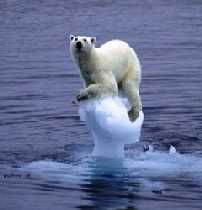Viewpoints on Global Climate Change
When I do radio or television interviews, it’s very common for me to be asked about “my opinion” on global climate change. The article linked above captures the heart of my response. I.e., I really don’t know how to have a viewpoint on a subject that is at odds from the established scientific consensus. The reason I believe in quarks and supernovae isn’t that I’ve experienced them personally, but rather that people I trust assert their existence. I’m really not interested in what some guy at the supermarket thinks.


Gee, what a thought – being data driven rather than opinion driven. Those of us in the university business are often perceived as being out of touch because answers to many questions are replied to in a seemingly non-committal fashion – Don’t yet have enough data; That study is incomplete, etc.
I personally find it quite easy to maintain a hard wall between my opinions and knowledge, and yet do not find that to be generally commonplace in the people I encounter. That said, there are the occasional academics who let their opinions and beliefs override their science. They are most often used as the subject matter experts for the promotion of alternative-science explanations.
Another angle I’ve run into is the notion that the democratic process is the top rung in the ladder for the determination of truth. Just because 90% of the population chooses to believe something, that then becomes a law of Nature? Odd ducks we are.
Interesting, and not particularly surprising.
One thing I would like to learn more about is the scale that was used… I think some of the difference – as the model seems to suggest slightly less concern than average not significantly less concern than average – may revolve around nuances.
I’m terribly concerned about the impacts of global warming… but if I were to see a questionnaire that asked whether I thought global warming would result in:
a: mostly good for society, more crops, milder winters, etc…
b: some good some bad, some places will have it better and others will have it worse, but it will balance out.
c: more good than bad, some places will benefit but there will be significant adjustment required to adapt to changing regional climates. Most areas will see far greater cost than benefit.
d: bad, rampant drought, widespread disease, rapidly rising oceans, forced migration, and widespread storm damage.
e. the end of life on Earth.
I would suspect there would be far more “e” and “d” selections from people who had a liberal leaning but little to no science background, while I suspect those with significant science background would be frustrated that there wasn’t a choice between “c” and “d”… but more would select “c” for the sake of integrity, as it includes the potential of some regions seeing benefit, though it doesn’t suggest the intensity of the potential accommodation costs.
In this HYPOTHETICAL case, the more scientifically literate the person being questioned, the less concern the respondent would show…
I’m not saying that’s the case with the study you linked to… I’m saying that I’d like to see the survey, and these types of studies are seriously vulnerable to misleading conclusions based on poorly selected options within the questions.
Aren’t rising ocean levels very bad for everyone?
Craig,
It depends on whether you live near the beach. Rising oceans won’t affect Canada much at all… but the arctic ice cap melting has opened up the Northwest passage for the first time in human history, and new trade between Scandinavia, Russia, and Canada is occurring every summer. If you lived up there, you’d think it was a great thing.
Last winter was the warmest winter in history… but most people thought that was a pretty good thing – much lower heating bills, less traffic issues with snow, less NG consumption which has lead to a tremendous increase in domestic oil production… etc..
Again, I’m worried about it. Some of the projections are BAD, but not everything will be negative. Trying to prepare for both the good and the bad is how we’re best going to get through this. Yes we need to mitigate what emissions that we can, but we also need to brace ourselves for change because even if we manage to keep ppm under 500 (and God I hope so, but I’m pretty sure that won’t happen), we’ll face a lot of change. Taking advantage of the opportunities will be just as important as preparing for the difficulties if we’re going to navigate through those changes.
Remember I’m just as concerned about climate change as you are.
🙂
I am fully aware that I do not understand the ins and outs and wherefores and therefores of global warming; however, I am confident that if I did, I would be able to present the discussion in such a way that others could understand it and politicians would not be able to dispute my clearly presented, quantitatively defended, visually compelling views. My suspicion is that most of the global warming experts don’t understand the full picture very well or one would step aside and write a book that clearly presented the options so we could all read and understand. The longer this debate continues, the larger the perceived ineptness and the lesser the credibility of the scientific community.